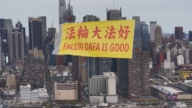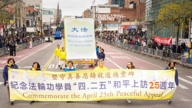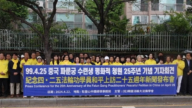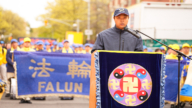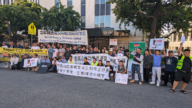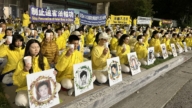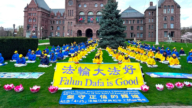【新唐人2014年04月24日讯】击鼓鸣冤古而有之,15年前万名法轮功学员前往中南海,要求释放被天津当局非法关押的法轮功学员,维护宪法赋予的信仰权力。外界认为,法轮功理性和平的上访,为中国百姓打破已经习惯的逆来顺受,不畏强暴,站出来维护自己的权益,开创了先河。
1999年4.25号,超过一万名法轮功学员,来到北京国务院信访局,要求结束公安对法轮功学员正在增强的骚扰,并释放天津被捕的45名学员。
据北京某大学实验师刘女士介绍,当时他们6点左右来到信访办门口,希望能向信访办反映情况,但是很快警察就领着他们,沿着府右街由北往南走,同时发现,在府右街的另一头,也有警察领着一队法轮功学员由南往北行进,最后在中间回合,法轮功学员静静的在那里,不时有学员出面,捡起警察扔下的烟头。
时任总理朱镕基出面召见法轮功学员代表,答应释放天津被捕的法轮功学员,承诺法轮功学员修炼环境不被骚扰,法轮功学员平和散去。
北京时政观察人士华颇:“我家当时离中南海非常近,我知道这个消息之后就骑车去了,看到有很多人,说是法轮功的修炼者,但是井井有条,可以说是鸦雀无声,整齐的在路旁边,没有妨碍任何人。”
中国“权利运动”组织发起人胡军:“当时看到就是非常振奋,同一时间,那么多人在中南海主张他们的权益,感到中国有希望了。”
事发后两天内,中共官媒没有对“4.25事件”进行报导,4月27号,《新华社》转载了中共当局发出的《公告》,说法轮功学员聚集在中南海周围,表示对各种炼功健身活动,各级政府从未禁止过。
许多西方媒体也报导说,法轮功学员上访是1989年六四事件后最大规模的上访﹔是近代中国历史上最和平理性的上访事件。
而时任中共党魁江泽民对此却表示震怒,要求对法轮功开展铁腕镇压,指责朱镕基的处理措施太过软弱。
从此,媒体报导由以前的“聚集在中南海周围”,改称为“围攻中南海”。各地公安出面骚扰炼功点,到国务院信访办反映情况的法轮功学员,由各地公安直接拉走,进行关押。
胡军:“过去老百姓有冤的话还可以拦轿,还可以击鼓鸣冤,还专门在衙门上放了一个鼓,供百姓来击鼓喊冤,现在把这个完全堵塞了,堵塞了还不说,他还设了一个信访办,让人们去,然后把人抓起来。”
在中共的历次运动中,多少社会精英受到摧残,迫害致死,不但没有人为他们鸣冤,甚至亲人还要与他们划清界限。
近年来,越来越多的民众站出来,为他们受到的冤屈上访。“中国天网人权事务中心”负责人黄琦表示,当时民众看到法轮功学员上访非常震惊,但是真正学习这种和平理性的方法,还经过了一个很长的过程。
中国天网人权事务中心负责人黄琦 :“本世纪大规模上访是源于法轮功当时前往北京要害部门的集体上访,其后对于上访的打压持续了较长的时间,大规模上访一度陷于沉寂,2003年,失地农民和拆迁户也前往北京,无数次遭关押打压后,民众开始实施聚集上访。”
据《江泽民文选》第二卷记载,4月25号当晚,江泽民给中共中央政治局常委及其他领导人写信,“要彻底消灭法轮功”,扬言“难道共产党人还战胜不了法轮功”。
当年6.10号,成立了“6.10办公室”,江泽民调动一切公权力镇压法轮功。
旅德政治学家仲维光: “这种对于民众上访的打压,无论从国际范围,从法制国家应有的规范来说,还是从中共自己口头声称的规范来说,都是非法的。”
15年过去了,法轮功学员一直在世界各个角落,坚持讲清真相,用和平理性的方式来反对中共的残酷虐杀。
采访编辑/刘惠 后制/周天
April 25 Appeal of Ten Thousand, A Dialogue Model for China
In ancient China, people would traditionally beat a drum
outside the court to lodge a complain against injustice.
Fifteen years ago, 10,000 Falun Gong practitioners
went to Zhongnanhai to appeal.
In order to maintain their rights of belief,
they requested the release of Falun Gong practitioners
illegally detained by Tianjin City authorities.
Observers say that Falun Gong practitioners’ rational
and peaceful appeals are pioneering the way to break
the Chinese peoples’ submissive habit and to stand up
for their rights without fear of violence.
On April 25, 1999, over ten thousand Falun Gong practitioners
went to the State Council in Beijing to request an end to the
increased harassment by the public security bureau, and
requesting the release of 45 practitioners arrested in Tianjin.
According to Ms. Liu, a university teacher in Beijing, at 6 am
Falun Gong practitioners arrived at the petition office and were
led by police to go from north to south along Fuyou Street.
They encountered another group of Falun Gong practitioners
led by police to go from south to north, and there ended up
being so many people that the two groups merged.
They waited there quietly, and some practitioners even
cleaned up the cigarette butts left by police.
Then-Premier Zhu Rongji showed up calling a meeting
with Falun Gong representatives.
Zhu promised to release the practitioners who
were arrested in Tianjin.
He also promised Falun Gong practitioners’
practice environment would no longer be disturbed.
Later Falun Gong practitioners quietly left the scene.
Hua Po, Beijing current affairs observer:
“My home was close to Zhongnanhai.
I rode a bike over there after I heard about the news.
I saw many people.
I was told that they were Falun Gong practitioners.
I could see they were very disciplined and calm, even silent.
They stood along the sidewalk without
disturbing the people passing by.”
Hu Jun, founder of Human Rights Campaign in China:
“I was amazed by the scene.
So many people appeared at the same time in Zhongnanhai to
request that their rights be honored, I felt China has a hope.”
Two days later, there was no official coverage
for the “4.25 incident”.
On April 27, Xinhua news agency circulated a notice
issued by the central government, saying that Falun Gong
practitioners gathered around Zhongnanhai.
It also said health practices of any kind
have never been prohibited by any level of government.
Many Western media have reported that Falun Gong
practitioners’ petition was the largest appeal since June 4, 1989.
Falun Gong’s appeal was the most peaceful and rational appeal
in the Chinese history.
However, former Chinese Communist Party leader Jiang Zemin
was angry about the incident.
He ordered to implement a suppression of Falun Gong,
He accused Zhu Rongji of handling the incident too softly.
Since then, media reports changed tune from previously calling
it a “gathering around Zhongnanhai” to “a siege of Zhongnanhai”.
Police in each city began harassing Falun Gong exercise sites.
Falun Gong practitioners who went to appeal would be taken
away and detained by their local police.
Hu Jun: “In ancient China, if civilians had been mistreated,
they could stop an official on the road, or beat a drum outside
a court to let their injustice be heard.
There was a drum specially placed outside
the court for civilians to use.
Nowadays, petitioning is completely blocked, furthermore,
the regime established an appeals office for petitioners,
but when petitioners go there they’re arrested.”
In each of the CCP’s past political movements, many talented
people were destroyed and persecuted to death.
Not only was there nobody who dared appeal for mistreatment,
but their relatives had to make a clear stance to denounce them.
In recent years, more and more civilians have stood up
to appeal for their mistreatment.
Huang Qi, founder of human rights website 64tianwang.com,
says that citizens were very shocked
when they saw Falun Gong practitioners appealing at the time.
It takes a very long time to learn the way to peacefully appeal.
Huang Qi: “In this century, the mass appeal started from
Falun Gong practitioners’ appealing to major organs in Beijing.
Later, the suppression of petitioners lasted a long time,
and it stopped for a while.
In 2003, farmers whose lands were seized and demolished
also went to Beijing to appeal.
After they were beaten and detained many times,
farmers started to appeal in groups.”
According to Jiang Zemin’s works, 2nd book, On the evening
of April 25, Jiang wrote letters to members of the politburo
standing committee and other CCP leaders.
He gave the order to “completely eliminate Falun Gong,” and
said, “I just don’t believe that the CCP can’t beat Falun Gong.”
On June 10, 1999, Jiang set up the 610-Office, specifically to
lead the suppression of Falun Gong.
He used all his power to suppress Falun Gong.
Zhong Weiguang, Germany-based political scientist:
“This kind of suppression of petition, to the international range,
to any legitimacy country, or to the CCP’s own claims, is illegal.”
15 years have passed, and Falun Gong practitioners still
clarify the truth in different part of the world, using peaceful
and rational means to go against the CCP’s brutal genocide.
Interview & Edit/Liuhui Post-Production/Zhoutian


